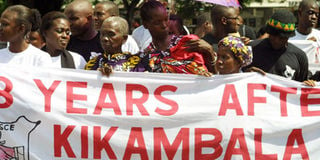2002: Terrorists hit Paradise Hotel after elaborate planning

Widows and orphans of the 2002 Kikambala bombing hold a huge banner during a special prayers to mark the 8th anniversary since the attack of the former Mombasa Paradise Hotel in Kikambala, Kilifi district. Photo/FILE
What you need to know:
- Of the 15 people who were killed, 12 were Kenyans while the rest were Israeli tourists.
- The Kenyans were members of a troupe performing a welcome dance for the arriving guests.
Al-Qaeda suicide bombers attacked Paradise Hotel in Kikambala, Mombasa County, killing 15 people and destroying the establishment.
The terrorists arrived at the gate of the Israeli-owned hotel in a green Pajero. In the vehicle were three men, who told the guards that they had come to see someone in the hotel. They were advised to wait for clearance.
Suddenly, one of the men jumped out, slipped under the barrier, and ran towards the reception desk, detonating explosives that were strapped to his body.
The other two then drove past the barrier and crashed into the hotel’s reception desk, detonating more explosives that were loaded in the car.
Of the 15 people who were killed, 12 were Kenyans while the rest were Israeli tourists. The Kenyans were members of a troupe performing a welcome dance for the arriving guests.
Another 80 people were injured.
At 8.40am that day, other terrorists fired a missile at an Israeli Arkia Airlines jet as it took off from Mombasa’s Moi International Airport. They missed their target and none of the 250 passengers and 10-member crew was harmed.
VIDEO SURVEILLANCE OF HOTEL'S GROUNDS
Investigations by American, Israeli, and Kenyan intelligence service teams into the hotel bombing revealed that preparations for the attack had started a year earlier.
In November 2001, the terrorists first met in Mogadishu, Somalia, to discuss a possible strike against Israeli interests in Kenya.
Their leader was Mohammed Fazul, Al-Qaeda’s senior representative in East Africa and one of the key architects of the 1998 bombings of the US embassies in Nairobi and Dar es Salaam.
By April 2002, the terrorists had singled out the Israeli-owned aircraft and the Paradise Hotel as their targets. The hotel catered to an exclusive Israeli clientele.
Over the next five months, the terrorists conducted video surveillance of the hotel’s grounds. They then made arrangements to smuggle two shoulder-fired Soviet-made SA-7B SAMs into Kenya from Yemen.
The terrorists assembled the bombs in a rented house in Tudor, Mombasa. They packed the bombs into their SUV, which was bought on November 15, 2002.
Kenya eventually managed to shed the negative publicity that the bombing earned the tourism industry. Australia, Britain, Canada, and the US temporarily shut their embassies and issued travel advisories against Kenya, warning their citizens of insecurity in the country.
The United Kingdom suspended flights to Kenya for a month.
Kenya has been a target of terror attacks for many years, thanks to of its leaning towards the West.




